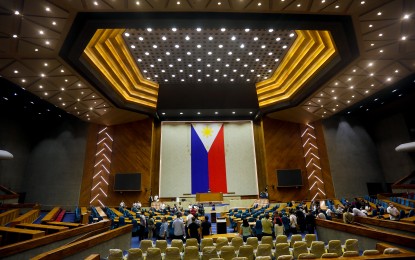
House of Representatives Plenary Hall (PNA file photo)
MANILA – The House of Representatives on Tuesday approved several bills aimed at improving the delivery of education.
During the plenary session, 255 lawmakers unanimously approved House Bill (HB) No. 9936, which seeks to provide the Department of Education the flexibility to use different approaches to teaching the basic education curriculum to ensure student mastery of knowledge and skills after each level.
HB 9936, which would amend Section 5 of the Enhanced Basic Education Act (Republic Act 10533), provides that the basic education curriculum and teaching approach shall be reviewed at least once every five years.
Getting a similar 255-0, the chamber also passed HB 9978, otherwise known as the proposed Moratorium on Payment of Student Loan Act.
Under the proposal, the payment of all fees and other charges on loans for higher education and technical-vocational education during emergencies will be suspended.
With 253 affirmative votes, 3 negative votes, and no abstention, the chamber passed HB 9982 or the proposed Strengthened Higher Education Institutions Act.
The bill mandates the Commission on Higher Education (CHED) to exercise reasonable supervision and regulation of public and private higher education institutions (HEIs).
CHED shall be vested with ample authority to set the mandatory minimum institutional and course requirements for all HEIs.
If enacted into law, the external governance of HEIs and programs in both public and private sectors, except for the University of the Philippines System, and the Mindanao State University System, shall be under the oversight function of CHED.
Meanwhile, the internal governance of HEIs shall be left to their respective governing boards and administrative officers.
All public and private HEIs must obtain prior authorization from the government before offering undergraduate, graduate, and post-graduate degree programs. (PNA)
